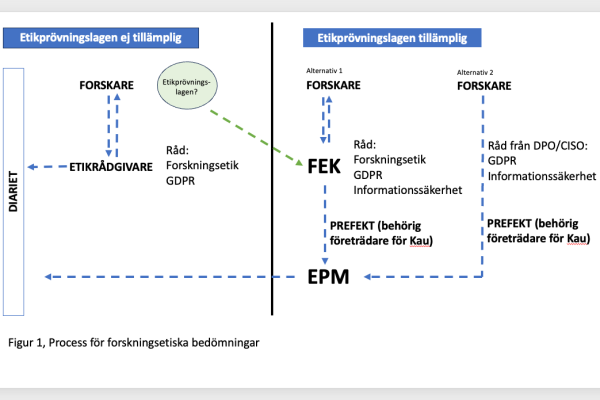Research ethics
Everyone at the university has a responsibility to ensure that research is undertaken in conformity with the law, in line with funders’ terms and conditions and in accordance with best current practice. To these ends, the university provides an environment where good research practice is encouraged throughout its research activities.
There are today a number of codes that are essentials tools in the support of researchers and all those engaged in research at the university. At Karlstad University The Quality model for education and research and the European Code of Conduct for Research Integrity sets out the standards of performance across all research activities. The primary purpose is to provide academic institutions and the research community with a framework for the continuous work to perform research with the highest standards of integrity.
The university also endorses the publication Good Research Practice, produced by the Swedish Research Council and directed towards researchers, which addresses relevant legislation and ethical requirements against the background of questions that may arise in research work. The aim is to provide a guide to issues within research integrity, to stimulate thought and to contribute to the debate on responsibility and challenges.
- KaU Policy: Quality model for education and research
- The Allea: European Code of Conduct for Research Integrity
- Swedish Research Council’s Good Research Practice
Ethical Approval
At Karlstad University, all research projects, including PhD projects, must undergo a review of ethical considerations. This applies to both externally funded projects and others. In the case where it is unclear if the research involves personal data or animal experiments, the researcher will complete an ethics questionnaire for the project, to provide the ethical advisers at the faculties with the information needed to assess its ethical considerations. All questionnaires are lodged with the registry (diariet).
Research involving people or sensitive personal data
If you are going to do research on people, human tissue or sensitive personal information, Karlstad University requires ethical approval from the Swedish Ethical Review Authority before the project can begin. The authority to represent Karlstad University as the authorized representative of the entity responsible for the research and to sign applications to the Swedish Ethical Review Authority has been delegated to the Head of Department.
All research conducted at Karlstad University that may fall under the provisions of the Ethical Review Act must, prior to submitting an application to the Swedish Ethical Review Authority, either:
- Be reported to the Research Ethics Committee for support with a comprehensive ethical assessment, or
- Be sent directly to the authorized representative of the entity responsible for the research (Head of Department) by the responsible researcher. In this case, an advisory risk analysis regarding data protection and information security, prepared by the Data Protection Officer and the Information Security Manager, must always be attached.
The responsible researcher decides whether the project should be submitted to the Research Ethics Committee or the Head of Department. In cases of uncertainty, this decision should be made in consultation with the faculty’s ethics advisor.
Templates and FAQ
Karlstad University recommends that our researchers always use the university’s templates and FAQ as support when preparing information letters for research participants and applications to the Swedish Ethical Review Authority.
The support documents are available on the Research Ethics Committee’s webpage.
It is also always possible to contact the ethics advisor, the information security officer, and the data protection officer for assistance in this work.
- Research ethics committee at Karlstad University
- Application via "Ethix" - Swedish Ethical Review Authority
Research involving animals
A regional animal committee shall review planned animal experiments. The research study must not begin before the board has approved it. At the Swedish Board of Agriculture's website you can read more about the rules that apply and the permits required for the use of animals in research. To seek guidance, you can contact the animal experimentation supervisor at the Department of Environmental and Life Sciences at Kau. Find the contact details on the right.
Research Misconduct
Examples of misconduct in research are falsification and fabrication of data, plagiarism, unauthorized use of information given in confidence, unjustified claim of authorship, failure to comply with ethical rules or equivalent rules and recommendations issued by the ethical review authority or other authority.
Scientific misconduct have unfortunately been shown to occur at various levels and within different disciplines. Karlstad University deals with suspected cases of scientific misconduct according to special regulations:

